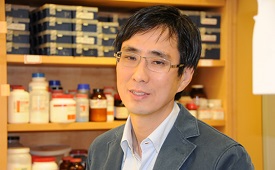
Jun R. Huh, PhD, assistant professor of medicine in the Division of Infectious Diseases & Immunology, has received the 2013 Smith Family Foundation Award for Excellence in Biomedical Research.
Jun R. Huh, PhD, assistant professor of medicine in the Division of Infectious Diseases & Immunology, received the 2013 Smith Family Foundation Award for Excellence in Biomedical Research, a highly competitive award intended to help launch the careers of newly independent biomedical researchers. Applicants, who are nominated by their institutions, must be full-time faculty at nonprofit academic, medical or research institutions in Massachusetts, at Brown University or at Yale University.
“This is a highly competitive grant, with applicants coming from the best institutions in the area, including Harvard, MIT, the Broad Institute and the Whitehead Institute,” said Gyongyi Szabo, MD, PhD, associate dean for clinical and translational research and professor and vice chair of medicine. “Dr. Huh investigates the interactions between intestinal microbes and host immune responses, a fascinating aspect of immunity that has clinical relevance to human diseases such as inflammatory bowel disease.”
“In my view, Jun is one of the most talented young investigators in the area of innate immunity today,” said Douglas Golenbock, MD, professor of medicine and microbiology & physiological systems and chief of the Division of Infectious Diseases & Immunology. “His work on the interaction of the host microbiota and immunity is both exciting and timely and has the potential to impact our views of a variety of medical disorders, including inflammatory bowel disease, obesity and diabetes.”
The three-year, $300,000 award goes to new faculty who are within two years of their first independent faculty appointment. Huh joined the UMMS faculty in August 2013.
Huh received his PhD from California Institute of Technology, Pasadena. His research focuses on the identification of chemical and genetic tools to regulate pro-inflammatory immune cells in murine disease models such as intestinal bowel diseases, and the pursuit of bacterial metabolites regulating host immune responses. He also studies epigenetic regulatory mechanisms as well as the mechanisms through which immune cells modulate neural development.
The Smith Family Foundation supports groundbreaking medical research through the Smith Family Awards Program for Excellence in Biomedical Research. Applications focus on all fields of basic biomedical science and may also be submitted by investigators in physics, chemistry and engineering. Since 1992, the program has funded 130 investigators for a total investment of $23 million.